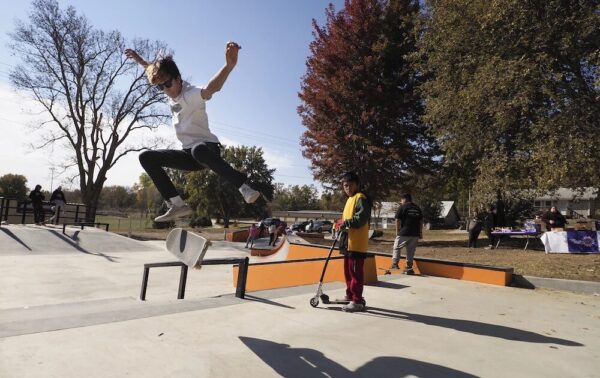A colleague recently forwarded me a news article from Nebraska’s Flatwater Free Press – They built a skate park in Nebraska’s poorest county. Then they watched Junior do something priceless. The article shares a beautiful story about the opening of skate park on the Omaha Reservation after community members garnered resources to construct the park after recognizing both the mental health challenges their youth were facing and the passion they had expressed for skateboarding. The story recounts a selfless act of kindness enacted by Junior, a 15-year old skater, that won’t surprise skateboarders, but likely might the rest of us. The article also mentions a Pullias Center report that helped inform the new project. It was just a sentence, but I will admit to being deeply moved by the acknowledgement that our skate research is making an impact.
Speaking of impact, when we launched the USC Skate Study project in 2018, I had no idea how the lessons I learned from skateboarders would influence my personal outlook as well as the work I do in higher education. In particular, I have learned a profound amount about mental health and wellness from the skateboarders who participated in our national Beyond the Board study – funded by The Skatepark Project (formerly the Tony Hawk Foundation) and our Mattering in the Margins study – funded by USC’s Office of the Provost’s New Strategic Directions for Research grant.
In the first study, responses from a national survey and interview data collected through case studies in diverse regions of the country (i.e. East LA, CA; Gallup, NM; Houston, TX; Johnson City, TN; Farmington/Detroit, MI; New York, NY; and Boston, MA), highlighted how the action of skateboarding and the community connected to skating were key elements in relieving stress, navigating hardships, and simply facilitating fun. Data illustrated how skateboarding encouraged people to be hyper-focused on the present moment, build community with other skaters regardless of race, social class and age (gender was a slightly more complicated finding — more on that later), and experience a sense of accomplishment after tenaciously practicing and finally sticking a trick. Skaters also shared how they often feel misunderstood and stigmatized. Analyzing skaters’ perspectives pushed our research team to consider about how we often group high school and higher education students into large categories — such as first generation or at-promise — without paying special attention to additional identities that play critical roles in how young people make sense of the world and think about their education and career opportunities.
The second study gave us an opportunity to explore the intersection of mental health, skateboarding and community more deeply. We designed a participatory action research project with a diverse group of interdisciplinary scholars and recruited 20 Los Angeles-based skaters to join us as co-researchers. I am totally stoked (had to be said) to share a newly-released video overview of the study where my colleague Neftalie Williams and I share our perspectives on why this research matters and how we conducted the study. And I’m even more excited to share a compilation of video clips from our skater-researcher colleagues that highlight key study findings (please also check out the skaters’ individual video clips below the compilation). The skaters help us understand the value of being seen and heard. They talk about overcoming hurt and how skateboarding helps them practice healing. They also make a case for why the non-skate world should listen to their voices. From their stories, the field of higher education can learn how to practice wellness in ways that are manageable (Steven Bradley, for example, talks about skating between classes to calm down and put his mind in the right state); how to listen carefully to the unique experiences diverse students bring to their pursuit of learning; and of the complexity and beauty of building community (here’s where the gender piece comes in…we learned a lot in the second study about the power of queer and gender diverse skate spaces).
Next steps for the USC Skate Study include an interdisciplinary collaboration where we are exploring how we might embed wellness resources in non-traditional spaces. We will be building onto the wisdom shared by the skaters who have collaborated with us. It is my hope that we’ll even be able to connect with Junior and his friends on the Omaha Reservation as I know they have a lot to teach us as well.







